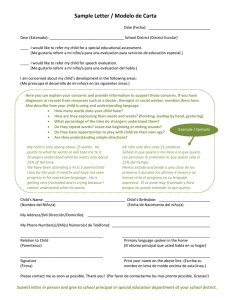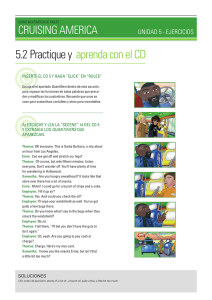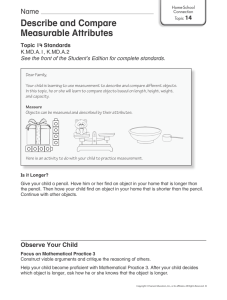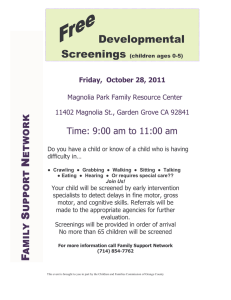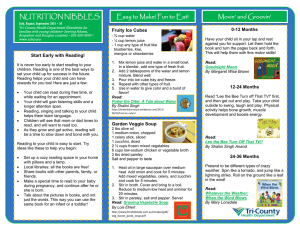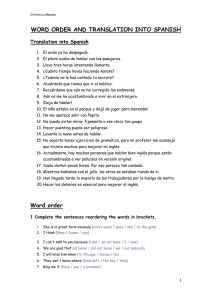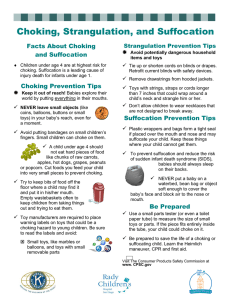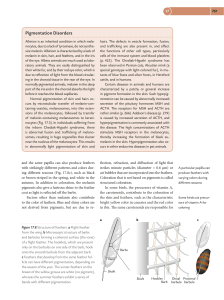Terapia ACTH Para Espasmos Infantiles
Anuncio
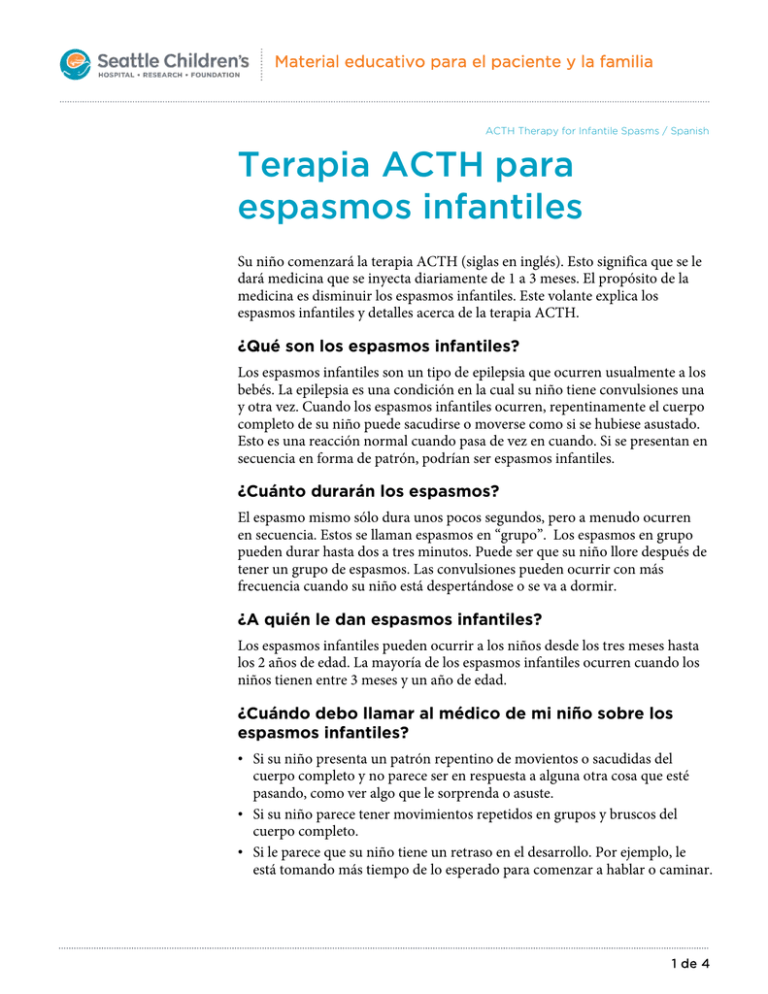
Material educativo para el paciente y la familia ACTH Therapy for Infantile Spasms / Spanish Terapia ACTH para espasmos infantiles Su niño comenzará la terapia ACTH (siglas en inglés). Esto significa que se le dará medicina que se inyecta diariamente de 1 a 3 meses. El propósito de la medicina es disminuir los espasmos infantiles. Este volante explica los espasmos infantiles y detalles acerca de la terapia ACTH. ¿Qué son los espasmos infantiles? Los espasmos infantiles son un tipo de epilepsia que ocurren usualmente a los bebés. La epilepsia es una condición en la cual su niño tiene convulsiones una y otra vez. Cuando los espasmos infantiles ocurren, repentinamente el cuerpo completo de su niño puede sacudirse o moverse como si se hubiese asustado. Esto es una reacción normal cuando pasa de vez en cuando. Si se presentan en secuencia en forma de patrón, podrían ser espasmos infantiles. ¿Cuánto durarán los espasmos? El espasmo mismo sólo dura unos pocos segundos, pero a menudo ocurren en secuencia. Estos se llaman espasmos en “grupo”. Los espasmos en grupo pueden durar hasta dos a tres minutos. Puede ser que su niño llore después de tener un grupo de espasmos. Las convulsiones pueden ocurrir con más frecuencia cuando su niño está despertándose o se va a dormir. ¿A quién le dan espasmos infantiles? Los espasmos infantiles pueden ocurrir a los niños desde los tres meses hasta los 2 años de edad. La mayoría de los espasmos infantiles ocurren cuando los niños tienen entre 3 meses y un año de edad. ¿Cuándo debo llamar al médico de mi niño sobre los espasmos infantiles? • Si su niño presenta un patrón repentino de movientos o sacudidas del cuerpo completo y no parece ser en respuesta a alguna otra cosa que esté pasando, como ver algo que le sorprenda o asuste. • Si su niño parece tener movimientos repetidos en grupos y bruscos del cuerpo completo. • Si le parece que su niño tiene un retraso en el desarrollo. Por ejemplo, le está tomando más tiempo de lo esperado para comenzar a hablar o caminar. 1 de 4 Terapia ACTH para espasmos infantiles ¿Qué es la terapia de la hormona adrenocorticotropa (ACTH)? ACTH es una hormona producida por la glándula pituitaria en el cerebro. Para ayudar a reducir los espasmos infantiles se usan inyecciones de ACTH. No sabemos exactamente porqué los inyecciones de ACTH dan resultados para disminuir los espasmos infantiles. La terapia ACTH se hace a través de inyecciones intramusculares. Esto significa que su niño necesita una inyección diaria en el músculo de la pierna durante 1 a 3 meses. El neurólogo de su niño le hablará exactamente por cuánto tiempo necesitará el tratamiento. La hormona ACTH se encuentra disponible solamente a través de una prescripción especial en la farmacia por correo. Hable con su seguro médico o proveedor de atención médica para obtener la aprobación antes que su niño empiece el tratamiento. Si necesita ayuda deje mensaje en la línea de la enfermera de neurología. Para comenzar la terapia ACTH, su niño tendrá que estar hospitalizado por 1 a 2 días. Es muy importante que usted esté en el hospital durante la estadía de su niño porque aprenderá cómo inyectar la hormona ACTH. También aprenderá acerca de los efectos secundarios del tratamiento de la hormona ACTH y a observar a su niño en caso que estos ocurran. Su niño será dado de alta del hospital cuando su neurólogo crea que usted está preparado para dar tratamiento al niño. Quieren estar seguros que usted puede aplicar las inyecciones de ACTH al niño y que qué hacer si tiene efectos secundarios. Las inyecciones ACTH deberá darlas diariamente en la casa. ¿Cuándo disminuirán o pararán los espasmos infantiles de mi niño? La terapia ACTH tiene un efecto diferente en cada niño. En la mayoría de los niños, se demora varias semanas antes que las convulsiones disminuyan o paren. En otros niños, es posible que el efecto sea inmediato. En algunos niños, la terapia ACTH no hará efecto y aún tendrán espasmos. Debido a que es diferente para cada niño, el neurólogo observará a su niño por si necesita algún cambio. Los neurólogos pueden cambiar la dosis o cantidad de ACTH que su niño está recibiendo o tomar otras decisiones sobre el tratamiento. Probablemente el niño necesitará una cita para hacerle un EEG para ver si el tratamiento ACTH está haciendo efecto. ¿Cuáles son efectos secundarios comunes de la terapia ACTH? Los efectos secundarios que ocurren cuando su niño está en terapia ACTH son temporales y debieran desaparecer al terminar la terapia. Mientras esté bajo terapia, su niño puede: • Sentirse irritable o molesto. • Tener más hambre de lo usual. 2 de 4 Terapia ACTH para espasmos infantiles • • • • Retener líquidos, podría verse hinchado o subir de peso. Desarrollar acné. Tener la presión de la sangre más alta que lo usual. Tener más probabilidad de enfermarse. Es importante que su niño no esté cerca de gente con influenza, resfriados u otros males contagiosos; es por eso que es importante evitar que su niño vaya a la guardería mientras esté bajo la terapia ACTH. ¿Cómo puedo ayudar a mi niño cuando esté molesto? Puede ser difícil cuidar a su niño cuando esté irritable o molesto. Algunas cosas que podrían ayudar a tranquilizarlo son las siguientes: • • • • Mecerlo La música suave Un baño tibio Envolverlo en una cobija Si desea saber más acerca de cómo tranquilizar a su bebé, hable con su neurólogo o enfermera de neurología. ¿Qué pasa cuando mi niño sale del hospital? Antes que den de alta a su niño del hospital, tendrá programada una visita de seguimiento en la clínica de neurología. La terapia ACTH puede causar problemas en algunos niños y es importante que el doctor de cabecera lo revise frecuentemente. Necesita revisión semanal de: • La presión de la sangre • La orina, para revisar los niveles de la glucosa • El peso A veces, los excrementos o deposiciones de los intestinos también necesitan revisarse, para asegurarse que no haya sangre oculta en ellos. Algunas de estas pruebas se pueden hacer en la casa. Otras necesitan hacerse en el consultorio del doctor de cabecera del niño, en una clínica o por la enfermera que presta servicios en la casa. ¿Cuándo debo aplicar la inyección ACTH a mi niño? • La inyección ACTH debe aplicarse todos los días antes de las 10 a.m. • Es muy importante no parar la medicina repentinamente. Eso puede causar efectos secundarios serios y disminuir la posibilidad que el tratamiento funcione. • Si cree que su niño tiene problemas con la medicina, llame al neurólogo del niño y pídale consejo. • Revise la cantidad de medicina que le queda para que no se le acabe. Nosotros podemos ayudarle con los surtidos, pero necesitamos por lo menos 5 días hábiles para obtenerla. 3 de 4 Terapia ACTH para espasmos infantiles Para más información • Neurología 206-987-2078 • El proveedor de atención médica de su niño • www.seattlechildrens.org Es muy importante que no se le acabe la medicina ACTH. Esta medicina se demora un poco más en ser obtenida que la mayoría de las medicinas ya que no se puede obtener en las farmacias, sino que sólo por correo. Puede ser peligroso que su niño se salte una inyección de ACTH en medio del tratamiento. Por esa razón, es muy importante que le mencione al grupo de atención médica de su niño con la mayor anticipación posible cuando se le vaya a terminar la medicina. ¿Cuándo debo llamar al doctor de mi niño en cuanto a problemas con el tratamiento? Llame al doctor de cabecera del niño si le pasa lo siguiente: Servicios gratis de interpretación • Dentro del hospital, solicítelo con la enfermera de su niño. • Fuera del hospital, llame a nuestra línea gratis de interpretación telefónica 1-866-583-1527. Menciónele al intérprete el nombre de la persona o extensión que necesita. • Para personas sordas y con problemas de audición 206-987-2280 (TTY). • Parece estar enfermo. Tener fiebre, signos de resfriado, influenza, diarrea, infección de oído u otros males. • Tener cambios repentinos en la manera de actuar o si hay un gran cambio en la forma de caminar, hablar, moverse o hacer sus actividades. • Se siente muy cansado o agotado. • Orina más o menos de lo normal. • Tiene sangre en los excrementos. • Tiene enrojecimiento o hinchazón en el área donde inyectó ACTH. ¿Qué debo hacer si tengo preguntas durante el tratamiento? Si tiene cualquier pregunta durante el tratamiento ACTH, debiera contactar inmediatamente al departamento de neurología: • De lunes a viernes, puede llamar a una de la enfermeras de la oficina de neurología: 206-987-2078. • Si llama después de las horas de oficina, fines de semana o días feriados, llame al 206-987-2000 y pida al operador del hospital que llame al residente de turno de neurología. • Si el niño no se siente bien y no puede contactar a su proveedor de atención médica, tráigalo al departamento de emergencia del hospital Children’s. Seattle Children’s ofrece servicios gratis de interpretación para pacientes, miembros de la familia y representantes legales sordos, con problemas de audición o con dominio limitado del inglés. Seattle Children’s pondrá a disposición esta información en formatos alternativos bajo solicitud. Por favor llame al Centro de recursos para las familias al 206-987-2201. Este volante fue revisado por personal clínico de Seattle Children’s. Sin embargo, las necesidades de su niño son únicas. Antes de actuar o depender de esta información, por favor consúltelo con el proveedor de atención médica de su niño. © 1999, 2001, 2003, 2008, 2010, 2013 Seattle Children’s, Seattle, Washington. Derechos reservados. Neurología 7/13 Tr (mg/jf) PE266 S 4 de 4 Patient and Family Education ACTH Therapy for Infantile Spasms Your child will be starting ACTH therapy. This means that they will take a medicine that is injected every day for about 1 to 3 months. The purpose of the medicine is to reduce infantile spasms. This handout explains infantile spasms and gives details about ACTH therapy. What are infantile spasms? Infantile spasms are a type of epilepsy that usually occurs in babies. Epilepsy is a condition where a child has seizures that happen time after time. When infantile spasms happen, your child’s whole body might suddenly jerk or move in a way that looks like they have been startled. This is a normal response when it happens every once in awhile. But when it happens over and over again, like a pattern, it might be infantile spasms. How long will the spasm last? The actual spasm only lasts only a few seconds, but they often happen over and over again in a row. These are called “clusters” of spasms. Clusters can last for as long as two to three minutes. Your child might cry after the cluster of spasms. The seizures may happen more often when your child is waking up or going to sleep. Who has infantile spasms? Infantile spasms can happen to children starting when they are 3 months old until they are 2 years old. Most infantile spasms happen when children are between 3 months old and 1 year old. When should I call my child’s doctor about infantile spasms? • If your child has a pattern of sudden full-body moving or jerking, and it does not seem to be in response to something else happening, like seeing something surprising. • Your child seems to have clusters of sudden full-body jerking movements. • Your child seems to have a delay in development. For example, they might be taking a longer time than expected to start talking or walking. What is Adrenocorticotropic Hormone therapy (ACTH)? ACTH is a hormone that is produced by the pituitary gland in the brain. Injections, or shots, of ACTH are used to help reduce infantile spasms. We do not know exactly why ACTH shots work to reduce infantile spasms. 1 of 4 ACTH Therapy for Infantile Spasms ACTH therapy is done through intramuscular injections. This means giving a shot to your child into a muscle in their leg every day for 1 to 3 months. Your child’s neurologist will talk to you about exactly how long your child needs treatment. ACTH is only available through a special mail order pharmacy. Talk with your insurance company or provider to get approval before your child starts the treatment. You can call the Neurology nursing line to get help with this if you need to. To start ACTH therapy, your child will have to stay in the hospital for 1 to 2 days. It is very important for you to be at the hospital during your child’s stay because you will learn how to give your child an ACTH shot. You will also learn about the side effects of ACTH treatment and how to watch your child to avoid having these happen. Your child will be sent home from the hospital when you and your child’s neurologist feel that you are ready to give your child the treatment. They will make sure that you are able to give ACTH shots to your child and that you know how to watch for and what to do about side effects. After discharge from the hospital, you will keep giving shots of ACTH to your child every day at home. When will my child’s infantile spasms decrease or stop? ACTH therapy works differently for every child. For most children, it takes several weeks before seizures slow down or stop. For other children, it might work right away. For some children, ACTH therapy will not work, and they will still have spasms. Because it is different for everyone, your child’s neurologist will watch your child to see if they need to change anything. They might change the dose or amount of ACTH that your child is taking, or make other decisions about treatment. Your child will probably need to get scheduled for EEGs to see how well ACTH treatment is working. What are the common side effects of ACTH therapy? The side effects that happen while your child is on ACTH therapy are temporary and should go away when the therapy stops. While they are on ACTH therapy, your child might: • • • • • • Feel irritable or fussy. Feel hungrier than usual. Retain fluid, look puffy and gain weight. Have acne. Have higher blood pressure than usual. Be more likely to get sick. It is important for your child not to be around people who have the flu, colds, or other contagious illnesses. For this reason, it is important to avoid having your child in daycare while on ACTH therapy. 2 of 4 ACTH Therapy for Infantile Spasms How can I help my child when they are fussy? It can be hard to take care of your child when they are feeling irritable and fussy. Here are some things that may help you calm or soothe your child: • • • • Rocking Soft music A warm bath Bundling in a blanket If you would like to learn more about soothing your baby, ask your neurologist or Neurology nurse. What happens when my child leaves the hospital? Before your child is discharged from the hospital, they will be scheduled for a follow-up visit in the Neurology clinic. ACTH therapy can cause problems for some children, and it is important that your child’s primary healthcare provider checks often to see how they are doing. Some of the things that needed to be checked every week are: • Blood pressure • Urine, to check glucose levels • Weight Sometimes, stools or bowel movements need to be checked, to make sure there is no hidden blood in them. You can do some of these tests at home. Other tests need to be done at your child’s primary doctor’s office, at a clinic or by a visiting nurse service. When do I give my child the ACTH shot? • Give your child an ACTH shot every day before 10 a.m. • It is important not to stop giving your child the medicine all of a sudden. This can cause them to have worse side effects and can reduce the chances for the treatment to work. • If you feel that your child is having problems with the medicine, call your child’s neurologist and ask for advice. • Check the amount of medicine you have left so that you do not run out. We can help you get a refill, but we need at least 5 business days to get it for you. It is very important that you do not run out of ACTH. It takes a little longer to get than most medicines, because you cannot get it in pharmacies, only through the mail. It can be dangerous for your child to miss their shots of ACTH in the middle of treatment. For that reason, it is very important that you tell your child’s healthcare team as early as possible before you are going to run out. 3 of 4 ACTH Therapy for Infantile Spasms To Learn More When should I call my child’s doctor about problems with treatment? • Neurology 206-987-2078 Call your child’s primary doctor if your child: • Ask your child’s nurse or doctor • www.seattlechildrens.org Free Interpreter Services • In the hospital, ask your child’s nurse. • From outside the hospital, call the toll-free Family Interpreting Line 1-866-583-1527. Tell the interpreter the name or extension you need. • Seems sick. Call if they have a fever, signs of a cold, flu, diarrhea, ear infection or other illness • Has a sudden change in the way they act, or if there is a big change in how they walk, talk, move or do other activities • Feels very tired or exhausted • Pees (urinates) more or less than usual • Has blood in their stool or bowel movements • Has redness or swelling in the area that you gave them the ACTH shot What should I do if I have questions during the treatment? If you have any questions during ACTH treatment, you should contact the Neurology department right away: • Monday through Friday, you can call one of the nurses in the Neurology office: 206-987-2078. • If you call after hours or during weekends or holidays, call 206-987-2000 and ask the hospital operator to page the Neurology resident on call. • If your child is not feeling well and you cannot contact your primary care provider, bring them to the Emergency Department at Children’s. • For Deaf and hard of hearing callers 206-987-2280 (TTY). Seattle Children’s offers interpreter services for Deaf, hard of hearing or non-English speaking patients, family members and legal representatives free of charge. Seattle Children’s will make this information available in alternate formats upon request. Call the Family Resource Center at 206-987-2201. This handout has been reviewed by clinical staff at Seattle Children’s. However, your child’s needs are unique. Before you act or rely upon this information, please talk with your child’s healthcare provider. © 1999, 2001, 2003, 2008, 2010, 2013 Seattle Children’s, Seattle, Washington. All rights reserved. Neurology 7/13 PE266 4 of 4
